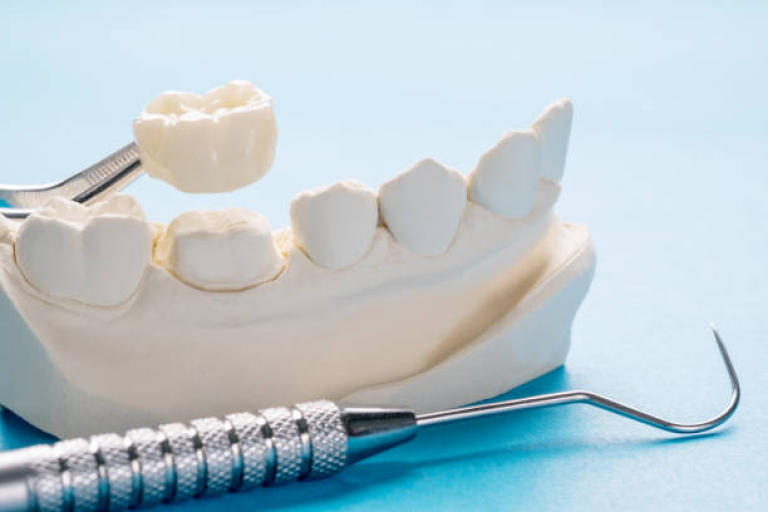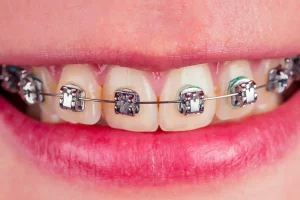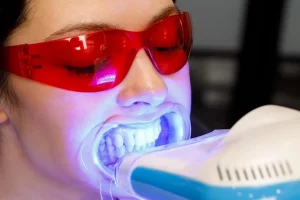Dental crowns are a standard dental procedure used to restore and protect damaged teeth. Several options are available, each with unique benefits. Understanding the differences between the types of dental crowns for teeth can help you make an informed decision about your oral health. In this article, we will explore the different types of dental crowns available, their benefits, and which one may be best suited for your individual needs.
What are dental crowns?
Dental crowns are caps that cover broken or afflicted teeth, restoring their shape, strength, and look. They completely cover the visible region of the tooth above the gum line. Crowns may be constructed from a variety of materials, including metal, porcelain, and ceramic. They are used to protect weak teeth, repair fractured teeth, support big fillings, secure dental bridges, cover implants, and enhance the appearance of colorless or misshapen teeth.
Types of Dental Crowns:
1) Metal Crowns:
Metal crowns are dental restorations built from various metal alloys, such as gold, palladium, nickel, or chromium. These crowns are well-known for their excellent durability and toughness, making them ideal for replacing severely damaged or decaying teeth, particularly those set in the back part of the mouth where chewing forces are strong.
Durability: Metal crowns are highly durable and can endure the pressures of chewing and biting.
Longevity: Metal crowns can survive many years, if not decades, with good maintenance before they need to be replaced.
Minimal Tooth Removal: Metal crowns have the advantage of requiring less tooth structure removal than other crown types.
Biocompatibility: The body typically tolerates metal alloys used in dental crowns well, making them safe for people with metal allergies.
Visibility: The primary disadvantage of metal crowns is their metallic hue, which is visible, especially at the front of the mouth. However, for back teeth, where aesthetics are less important, this may not be an issue.
2) Porcelain-Fused-to-Metal (PFM) Crowns
Porcelain-fused-to-metal (PFM) crowns are dental restorations that combine metal strength with a porcelain-like look. They are made of a metal foundation or substructure coated or fused with layers of tooth-colored porcelain. PFM crowns are one of the most famous crown types because they combine strength and aesthetics.
Strength and durability: PFM crowns are suited for recovering both front and back teeth due to their metal substructure’s high strength and endurance.
Natural appearance: The porcelain outer layer is designed to mirror the color and clarity of natural teeth, resulting in a more natural-looking repair than all-metal crowns.
Versatility: PFM crowns are suitable for a variety of dental restorations, including single crowns, bridges, and implant-supported restorations.
Adaptability: The metal substructure enables accurate fitting and adaptation to the tooth, resulting in a stable and long-lasting repair.
Biocompatibility: The metal used in PFM crowns is generally well tolerated by the body, reducing the likelihood of allergic responses.
3) All-Resin Crowns
All-resin crowns are dental restorations entirely composed of composite resin. They are frequently utilized as a short-term treatment for patients who seek an affordable choice. These crowns are more susceptible to wear and fractures compared with metal or porcelain crowns, but they may be easily created and coated to look like natural teeth.
Cost-Effective: All-resin crowns are often less costly than metal, porcelain-fused-to-metal (PFM), and all-ceramic crowns.
Aesthetic appearance: While they can be coloured to match your natural teeth, they may not have the same clarity and natural look as porcelain or ceramic crowns.
Less durable: All-resin crowns are more likely to wear, fracture, and chip than metal or porcelain-based crowns. They are less durable and are often utilized for teeth that are not subjected to high chewing pressures.
4) All-Ceramic or All-Porcelain Crowns
All-ceramic or all-porcelain crowns are dental crowns for teeth that are built entirely of ceramic or porcelain materials. They are popular choices for front tooth restorations because of their authentic look and ability to blend into the color of the surrounding teeth. These metal-free crowns help people with metal allergy or sensitivity.
Material: It is entirely made of high-quality ceramic or porcelain, with a transparent and realistic appearance that closely matches genuine teeth.
Aesthetics: These crowns have the finest color match and look, making them perfect for repairing visible teeth. The material’s transparency resembles actual tooth enamel.
Biocompatibility: They are metal-free, which reduces the risk of allergic responses or sensitivities associated with metal-based crowns. This makes them an excellent alternative for people with metal sensitivities.
Strength: While they are not as durable as metal or porcelain-fused-to-metal (PFM) crowns, advances in dental materials have substantially increased their longevity. They are appropriate for front teeth and some rear teeth, but not all back teeth with the highest chewing pressures.
5) Pressed Ceramic Crowns
Pressed ceramic crowns are a type of crown made from a solid ceramic block that has been Pressed and sculpted to suit a tooth. These crowns are not only visually appealing but also shock-resistant and durable. Pressing them also allowed for a precise fit and a natural look, so they were chosen by both professionals and patients for both anterior and posterior teeth. Pressed ceramic crowns are biocompatible and resistant to wear and discolouration.
Material: It is made from high-quality ceramic that is pressed rather than stacked, resulting in a thick and sturdy construction.
Strength and durability: The pressing technique makes these crowns harder and more resistant to fractures and chipping than regular all-porcelain crowns. They are ideal for both front and back teeth.
Aesthetics: Pressed ceramic crowns provide a very natural appearance, with superb color matching and translucency that resembles genuine teeth.
Precision fit: The pressing procedure ensures a flawless fit, so the crown fits firmly over the prepared tooth.
Benefits of dental crowns:
Dental crowns for teeth provide various advantages for both oral health and appearance. Here are some of the primary benefits of dental crowns.
1) Restoring Tooth Structure a nd Functionality
Preservation of Teeth: Crowns safeguard and maintain the remaining tooth structure, preventing more decay or damage.
Enhanced strength: They strengthen weak or cracked teeth, allowing them to endure biting and chewing pressures.
Improved function: Crowns restore the normal function of teeth, allowing for easy eating and speech.
2. Aesthetic enhancement
Natural appearance: Crowns may be made to match the color, shape, and size of the surrounding teeth, seamlessly merging with your smile.
Cosmetic Improvements: They hide flaws such as chips, cracks, discolouration, or abnormalities, improving the overall look of your teeth.
Boosted confidence: Crown’s aesthetic benefits can boost self-esteem and confidence, allowing you to smile confidently.
3. Longevity and durability
Long-Lasting Solution: With appropriate maintenance, dental crowns can last for many years, giving a durable and effective treatment.
Resistance to Wear: High-quality materials, such as porcelain or ceramic, are resistant to wear and will retain their look over time.
Invest in oral health: Crowns are an excellent investment in your dental health, decreasing the need for regular repairs or replacements.
4. Versatility in applications
Wide Range of Applications: Crowns are flexible and may treat a variety of dental problems, including decay, fractures, big fillings, root canals, and missing teeth.
Support for Adjacent Teeth: They support and stabilize the surrounding teeth, preventing them from moving or misaligning.
Compatible with Dental Implants: Crowns can be used to repair dental implants and finish the prosthetic restoration of lost teeth.
5. Pain Relief and Comfort.
Pain reduction: Crowns cover exposed tooth surfaces and reduce sensitivity to heat, cold, and pressure stimuli.
Improved comfort: They restore the standard form and size of teeth, resulting in a more pleasant bite and eating experience.
Dental stability: Crowns help maintain tooth stability and alignment, reducing discomfort caused by misplaced or broken teeth.
6. Preservation of Oral Health
Preventing more damage: Crowns protect weak teeth from decay, fractures, and wear, reducing the need for more comprehensive procedures in the future.
Gum Health Maintenance: Well-fitted crowns help to maintain healthy gums by sealing off germs and irritants, lowering the risk of gum disease.
Overall Oral Wellness: Crowns help to improve overall dental health and well-being by restoring function, aesthetics, and stability.
7. Customization and Personalization
Tailored Solutions: Crowns are tailored to each patient’s specific dental architecture, resulting in a precise fit and excellent performance.
Materials Selection: Crowns are available in a variety of materials, allowing patients and dentists to select the most appropriate solution based on aesthetics, durability, and affordability.
Patient involvement: Patients take part in the crown design process, working with their dentist to get the perfect crown for their smile.
Conclusion
To summarize, dental crowns for teeth can be split into several forms, each with its own set of features for teeth restoration. Whether you need to reinforce a weakened tooth, improve its beauty, or restore functioning, there are types of dental crowns to meet your demands. Discuss this with your dentist before getting dental crowns for your teeth. They range from long-lasting metal crowns to aesthetically stunning all-ceramic choices, offering stable options to boost oral health and confidence in your smile. Dental crowns are crucial devices in modern dentistry, providing maximum function and aesthetics for a healthier, happier smile.





